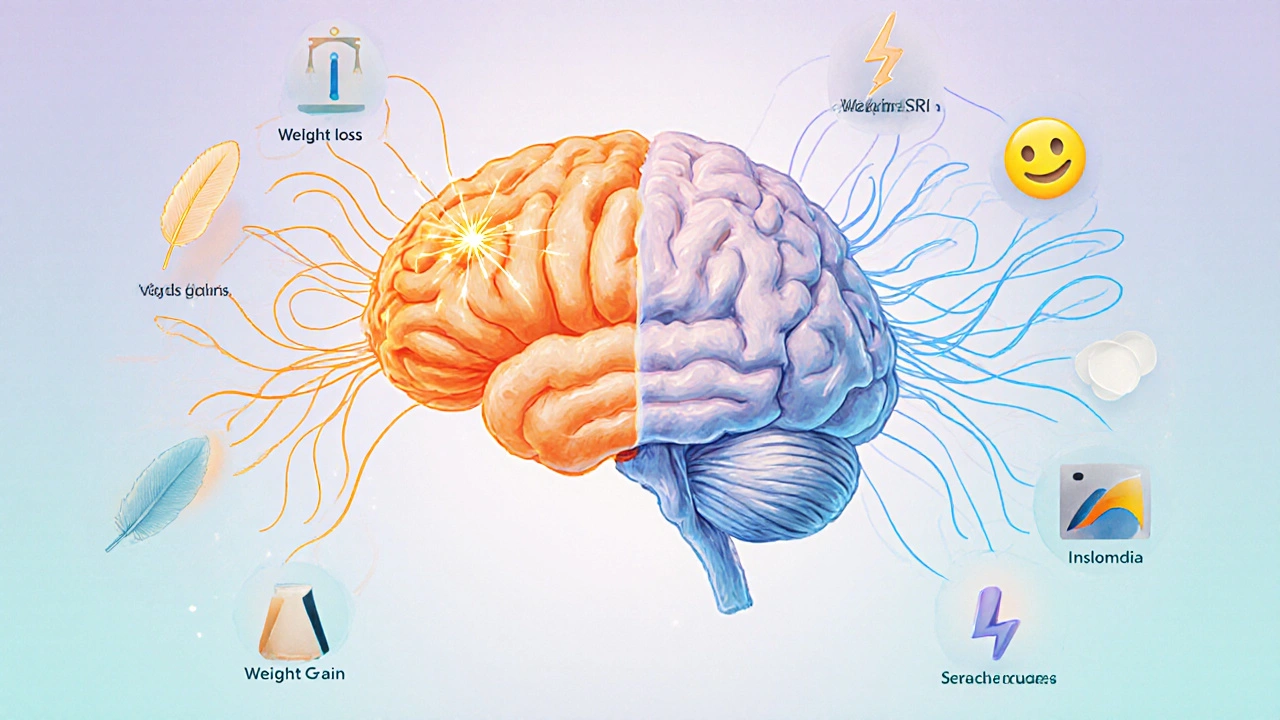Antidepressant Comparison Tool
Select Medications to Compare
When you’re battling depression or trying to quit smoking, the medication you pick can change how quickly you feel better and how many unwanted side effects you endure. Wellbutrin (bupropion) often shows up as a go‑to option, but a host of other antidepressants promise similar relief with different trade‑offs. This guide walks through the science, the pros and cons, and a side‑by‑side look at the most common alternatives so you can decide which pill fits your lifestyle.
Quick Take
- Wellbutrin is a norepinephrine‑dopamine reuptake inhibitor (NDRI) approved for major depressive disorder (MDD), seasonal affective disorder, smoking cessation, and off‑label weight loss.
- Common alternatives include SSRIs (Prozac, Zoloft, Lexapro), SNRIs (Cymbalta, Effexor), and older tricyclics (Amitriptyline).
- Wellbutrin’s biggest advantages are low sexual‑dysfunction risk and modest weight‑loss potential; its downsides are insomnia, anxiety, and a higher seizure threshold at high doses.
- SSRIs excel at anxiety relief and have the longest safety record, but they often cause sexual side effects and weight gain.
- SNRIs balance serotonin and norepinephrine, useful for chronic pain, yet they can raise blood pressure.
What Is Wellbutrin (Bupropion)?
Wellbutrin is a prescription medication whose active ingredient is bupropion hydrochloride, a norepinephrine‑dopamine reuptake inhibitor (NDRI). It received FDA approval in 1985 for depression and later for smoking cessation under the brand name Zyban. Bupropion’s chemical structure (C13H18ClNO) allows it to boost dopamine and norepinephrine levels without directly affecting serotonin, which sets it apart from the more common SSRIs.
Typical starting doses for depression are 150mg once daily, titrated up to 300mg twice daily for a total of 600mg. For smoking cessation, the regimen begins at 150mg once daily and steps up to 300mg twice daily over three weeks.
How Does It Work?
Bupropion blocks the reuptake pumps for norepinephrine and dopamine in the brain, leaving more of these neurotransmitters available in the synaptic cleft. The increase in dopamine is thought to improve motivation, while norepinephrine boosts alertness. Unlike SSRIs, there’s no direct impact on serotonin, which explains the lower incidence of sexual dysfunction.
Because it affects dopamine, bupropion also reduces cravings for nicotine, making it a preferred option for smokers trying to quit.
Key Benefits & Risks of Wellbutrin
- Low sexual side‑effect profile: Studies show less than 10% of patients report decreased libido compared to 30‑40% on SSRIs.
- Weight‑loss potential: Clinical trials observed an average loss of 3‑5lb over 12 weeks when used off‑label for obesity.
- Energy boost: Many users feel more alert within days, helpful for “brain fog” often accompanying depression.
- Seizure risk: Doses above 450mg/day increase seizure probability, especially in patients with a prior seizure history or eating disorders.
- Insomnia & anxiety: The stimulant‑like effect can worsen anxiety or cause difficulty sleeping if taken too late in the day.

Top Alternatives to Wellbutrin
Below are the most frequently prescribed antidepressants that doctors consider when bupropion isn’t a perfect fit.
- Prozac - generic name fluoxetine, an SSRI approved for MDD, OCD, bulimia, and panic disorder.
- Zoloft - sertraline, another SSRI widely used for anxiety, PTSD, and postpartum depression.
- Lexapro - escitalopram, a highly selective SSRI with a favorable side‑effect profile for many patients.
- Cymbalta - duloxetine, an SNRI that also treats chronic musculoskeletal pain.
- Effexor - venlafaxine, an SNRI effective for severe depression and anxiety.
- Amitriptyline - a tricyclic antidepressant (TCA) used for depression, migraine prophylaxis, and insomnia.
Side‑by‑Side Comparison
| Attribute | Wellbutrin (Bupropion) | SSRI (e.g., Prozac, Zoloft) | SNRI (e.g., Cymbalta, Effexor) | Tricyclic (Amitriptyline) |
|---|---|---|---|---|
| Primary Mechanism | NDRI - blocks norepinephrine & dopamine reuptake | SSRI - blocks serotonin reuptake | SNRI - blocks serotonin & norepinephrine reuptake | Inhibits reuptake of norepinephrine & serotonin, also blocks histamine & acetylcholine receptors |
| FDA‑Approved Uses | Major depressive disorder, seasonal affective disorder, smoking cessation, off‑label weight loss | Depression, anxiety disorders, OCD, PTSD, bulimia | Depression, generalized anxiety, neuropathic pain, fibromyalgia | Depression, chronic pain, migraine prophylaxis |
| Typical Daily Dose | 150‑300mg once daily → 300mg twice daily | 20‑80mg once daily (varies by drug) | 30‑120mg once daily (Cymbalta) / 75‑225mg once daily (Effexor) | 25‑150mg at bedtime |
| Sexual Side Effects | Low (≈5‑10%) | Common (≈30‑40%) | Moderate (≈20‑30%) | Variable, often low but can cause erectile dysfunction |
| Weight Impact | Neutral to slight loss | Neutral to gain | Neutral to gain | Potential gain |
| Insomnia/Agitation | Often ↑, especially if taken late | Rare, may cause fatigue | May cause insomnia at higher doses | Often causes sedation |
| Seizure Risk | Higher at >450mg/day | Very low | Low | Low |
| Blood Pressure Effect | Generally neutral | Neutral | May raise systolic pressure | Can cause orthostatic hypotension |
| Onset of Action | 1‑2 weeks for mood lift | 2‑4 weeks | 2‑4 weeks | 2‑4 weeks |
When to Choose Wellbutrin Over Others
If you’ve struggled with sexual side effects on an SSRI, experience unwanted weight gain, or want a medication that doubles as a smoking‑cessation aid, bupropion shines. It’s also a good pick when you need an energizing effect-think “depressed but stuck in a fog.” However, avoid it if you have a seizure history, uncontrolled hypertension, or a tendency toward anxiety.
For patients whose primary issue is pervasive anxiety or obsessive‑compulsive symptoms, an SSRI like Prozac or Zoloft generally offers stronger anxiolytic properties. When chronic pain is part of the picture-fibromyalgia, diabetic neuropathy-an SNRI such as Cymbalta may provide dual relief.
Older adults or those on multiple medications often stay on tricyclics only when other classes fail, because of the higher risk of cardiac toxicity and drug-drug interactions.
Common Pitfalls & Tips for Success
- Take bupropion in the morning to dodge insomnia.
- Avoid alcohol while on bupropion; it can lower seizure threshold.
- If you notice jittery feelings, ask your doctor about splitting the dose (e.g., 150mg three times daily).
- When switching from an SSRI to bupropion, a 1‑week washout reduces serotonin syndrome risk.
- Monitor blood pressure during the first month if you’re on an SNRI.
Next Steps
Talk to your GP or psychiatrist about your symptom profile, lifestyle, and any past medication experiences. Bring a list of current prescriptions, supplements, and any history of seizures or heart conditions. A clear conversation will help the clinician match you with the drug that balances efficacy and tolerability.
Remember, medication is only one part of the depression puzzle. Combining the right pill with therapy, regular exercise, and a supportive social network gives the best odds of staying well long term.

Frequently Asked Questions
Can Wellbutrin help me quit smoking?
Yes. The same bupropion formulation sold as Zyban is FDA‑approved for smoking cessation. It reduces nicotine cravings and withdrawal symptoms by increasing dopamine in the brain’s reward pathways.
Why do I feel more anxious after starting Wellbutrin?
Bupropion’s stimulant‑like effect can heighten anxiety, especially at higher doses or if taken later in the day. Splitting the dose or lowering the amount often eases the issue.
Is it safe to combine Wellbutrin with an SSRI?
Doctors sometimes prescribe a combination for treatment‑resistant depression, but it requires careful monitoring for increased seizure risk and serotonin syndrome. Never start the combination on your own.
How long does it take to see mood improvement with Wellbutrin?
Most patients notice a lift in energy and motivation within 1‑2 weeks, but full antidepressant effects may take 4‑6 weeks.
What should I do if I miss a dose?
Take the missed tablet as soon as you remember unless it’s near bedtime; then skip it and resume your regular schedule. Doubling up can increase seizure risk.
